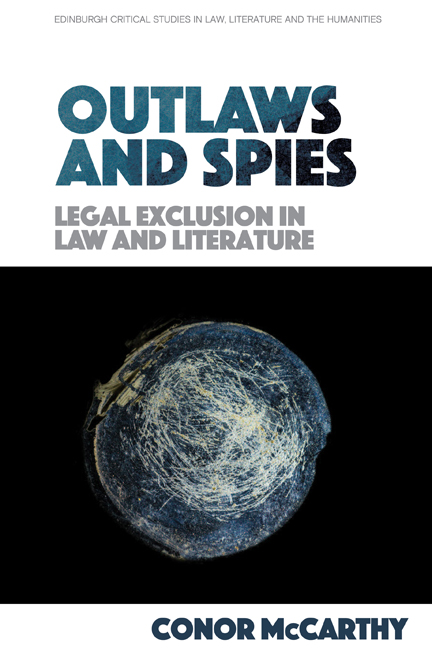Book contents
- Frontmatter
- Contents
- Acknowledgements
- Introduction
- 1 Outside the Law in the Middle Ages
- 2 Sovereign Outlaws: Shakespeare’s Second Tetralogy
- 3 The Endurance of Exclusion: Versions of Ned Kelly
- 4 ‘We’re Not Policemen’: Espionage and Law in John le Carré
- 5 ‘All Plots Tend to Move Deathward’: Plots and Consequences in Don DeLillo
- 6 Unanswered Questions: Ciaran Carson
- 7 Contesting the Virtual: William Gibson
- Conclusion
- Bibliography
- Index
5 - ‘All Plots Tend to Move Deathward’: Plots and Consequences in Don DeLillo
Published online by Cambridge University Press: 08 October 2020
- Frontmatter
- Contents
- Acknowledgements
- Introduction
- 1 Outside the Law in the Middle Ages
- 2 Sovereign Outlaws: Shakespeare’s Second Tetralogy
- 3 The Endurance of Exclusion: Versions of Ned Kelly
- 4 ‘We’re Not Policemen’: Espionage and Law in John le Carré
- 5 ‘All Plots Tend to Move Deathward’: Plots and Consequences in Don DeLillo
- 6 Unanswered Questions: Ciaran Carson
- 7 Contesting the Virtual: William Gibson
- Conclusion
- Bibliography
- Index
Summary
‘It's no accident’, says Don DeLillo, ‘that my first novel was called Americana. This was a private declaration of independence, a statement of my intuition to use the whole picture, the whole culture’. This urge to show ‘the whole picture’, the broad and extended meditation on contemporary America in DeLillo's work, reaches a climax in Underworld, an epic portrait of the United States in the latter half of the twentieth century. In looking at ‘the whole culture’, DeLillo perhaps inevitably shows an enduring interest in both the agents of the state and their opponents.
Such agents are frequently seen or suggested to act either outside or against the law. Running Dog features a fully fledged extralegal paramilitary force operating within the forces of the American state, ‘run contrary to the spirit and letter of every law, every intelligence directive, that pertains to such matters’. ‘Spy work, undercover work’, Guy Banister says in Libra, ‘we invent a society where it's always wartime. The law has a little give’ (Libra, p. 64). ‘A government is a criminal enterprise’, Richard Elster suggests provocatively in Point Omega, a text concerned among other things with CIA rendition and torture (Point Omega, p. 33). And at the heart of DeLillo's body of work is a version of the Kennedy assassination where a coalition of disgruntled former CIA agents set out to make an attempt on the President's life.
From The Names onwards, works engaged with these themes are placed in specific historical contexts: the Iran hostage crisis for The Names, the Kennedy assassination for Libra, the events of 1989 for Mao II, the broad backdrop of the Cold War for Underworld, the anti-globalisation movement for Cosmopolis, 9/11 for Falling Man, and the Iraq war for Point Omega. DeLillo's engagement with these issues in such contexts offers (like other aspects of his work) what John Duvall calls a ‘repeated invitation to think historically’. But DeLillo's fiction is often concerned with history of a particular sort, ‘a kind of underhistory’ as he says of Underworld.
- Type
- Chapter
- Information
- Outlaws and SpiesLegal Exclusion in Law and Literature, pp. 134 - 158Publisher: Edinburgh University PressPrint publication year: 2020



